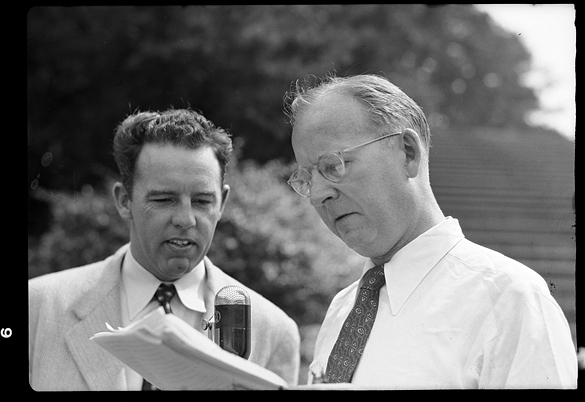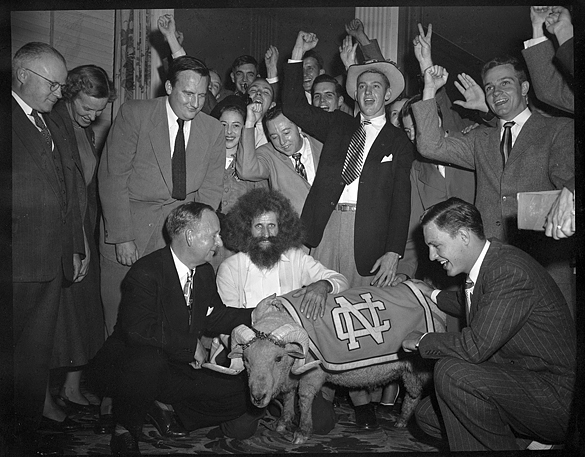A Gentleman by instinct, an athlete by hope, and a genius by nature—this is Julius Jennings Wade.
—Yackety Yack (UNC Yearbook), 1923
Today’s post is by A View to Hugh contributor Jack Hilliard, marking the fiftieth anniversary of Jake Wade’s death.

His byline as editor of the Daily Tar Heel was J.J. Wade. His dear friend Smith Barrier, Sports Editor of the Greensboro Daily News, called him Julius. Fellow Sports Information Director at Wake Forest, Marvin “Skeeter” Francis, referred to him as Mr. Wade . . . but the entire Tar Heel Nation and countless thousands across the Carolinas and beyond called him Jake—a friend of all who knew him.
Following his graduation in June 1923, Jake Wade took a job writing for the Gastonia Gazette. He then moved on to similar positions in Raleigh, Fayetteville, Charlotte, Columbia, Pittsburgh, and Greensboro where he did political reporting in addition to his sports work. By December 1930 he was back in Charlotte as Sports Editor of the Charlotte Observer, a position he would hold for fifteen years. His first assignment at the newspaper was to interview new Duke Head Football Coach Wallace Wade, who had just left the University of Alabama for the Durham campus. With the Charlotte Observer‘s circulation of 100,000, “Jake Wade’s Sports Parade” column became an instant hit with its readers. Charlie Justice, UNC’s great All America football player, once said “if you made Jake Wade’s column, you were almost assured of being selected All State.” (Justice was mentioned and was selected.)
Wade put together a first-class staff in Charlotte. In 1936, while covering American Legion Junior Baseball, Wilton Garrison caught Wade’s attention and he brought in Garrison as the assistant sports editor. Garrison would succeed Wade as sports editor of the Charlotte Observer ten years later. Among Wade’s other hires was a student at Presbyterian Junior College, then located in Maxton. The young man was James B. McMillan, who would later make a name for himself as a Golden Gloves boxer, a trial lawyer, and a United States district court judge. In the 1970s McMillan would preside over the famous Charlotte-Mecklenburg school-busing case. Another member of Jake Wade’s sports team was a student at Wake Forest College, which was located in Wake County in those days. The student, whose father was the police chief in Monroe, was named Jesse Helms, Jr. Of course he later became a radio and TV commentator, and, in 1972, an elected United States Senator from North Carolina.
(A side note: One of the carriers for the Observer during the late 1930s was a high school kid from Dallas, North Carolina named William Clyde Friday. Need more be said?)
In addition to his exceptional writing and a mastery of the English language, Jake Wade founded the Charlotte Observer-sponsored Carolina Golden Gloves, and was co-founder of the Charlotte Quarterback Club and the Carolina Boys Baseball Game.
The Charlotte Observer sports section under Wade’s leadership was world class—covering major league and the Charlotte Hornets baseball teams, the great and not so great boxing of the 1930s, and football of every description. But Jake Wade was never far removed from his Tar Heels from Chapel Hill. Case in point: his column following the 1935 UNC-Duke Football game, a game the Tar Heels needed to win for a trip to the Rose Bowl. Wade titled it “Thorns for Roses,” and it went like this:
Roses are the loveliest of flowers, but ambitious football teams know only their thorns. Had North Carolina beaten Duke Saturday it is quite likely the Tar Heels would have gone to the Rose Bowl. And the Tar Heels knew it. Everybody knew it. . . Everybody said Carolina would win, and the Chapel athletes must have kept reading it in the papers. Drinking it in. Digesting it. Basking in the glory of it. Yet the Tar Heels didn’t win. They didn’t come close. The Tar Heels were buried deep in the turf, 25 to 0. So the Tar Heels will get to eat their Christmas dinner at home. They will not go to the Rose Bowl. They get only the thorns from the roses, and thorns have no fragrance. They only stick you.
A great example of Jake Wade’s ability to breathe life into the printed word. His byline was a mark of quality. (If you would like to read more of his writing, seek out Jake Wade’s Sports Parade: Selected Columns published in 1941.)

After fifteen years of the burden of producing six columns a week and the accompanying long hours, Wade was ready for a career change. In late 1945, he left Charlotte and headed east to his alma mater, arriving in Chapel Hill in time to celebrate Charlie Justice and the era that bears his name.
Wade picked up where he left off in Charlotte, with a syndicated weekly column as well as a column in each home game football program. The columns were called “Jake Wade’s Carolina Caravan,” and it included all things Carolina. He was a newspaperman who enjoyed college life and the honor and privilege of writing his kind of prose about young folks who were stars on the field—on the court and on the campus. His love of the game, the players, and coaches was a compelling force in his life. Strangely enough, however, perhaps his most famous “Carolina Caravan” column was not about sports. It told the story of Chapel Hill, a place that UNC grads love, but only Jake Wade could bring to life on paper. He called it “A Town Touched by Strange Magic,” and it begins like this:
This is a town touched by strange magic and one to which its peoples, many of them a curious breed, hold a rare and somewhat inexplicable attachment. Our town has no rivers, no mountains, no seas, but in the spring it is beautiful and in all seasons it is both wonderful and sad, romantic in the spirit of the youth it harbors in the educational process of the great State University, which is the town’s principal industry.
Chapel Hill, where bells wake you in the morning, regardless of whether you live in the Beta house, Cobb dormitory or on Laurel Hill, and where the bells keep ringing periodically the day long, with the chimes taking over the majesty of twilight and on certain important occasions such as the big football games.
Probably no one sports figure ever captured Wade’s imagination more than Charlie Justice. In 1953 Wade wrote an essay titled “The Man Called Justice.” In it he said:
“He (Justice) achieved plenty. I was there, Mister, as sports publicist, and if Justice was a coach’s dream, he was a publicist’s peaches and cream. I must have written a million words extolling his virtues and dispatched thousands of pictures to newspapers and magazines . . . .”
The essay was accompanied by four Hugh Morton photographs and was published in the “All South Football Annual” at the beginning of the ’53 football season.
During a visit with Charlie and Sarah Justice in 2003, I asked Charlie how he became one of the most widely publicized players in football history without all those ESPN channels and no Saturday “film at 11.” Said Justice, “I didn’t need all that. I had Jake Wade writing and Hugh Morton taking pictures.”
On May 8, 1962, Jake Wade finished writing a column about the UNC-Miami tennis match in Chapel Hill which drew 3,500 fans. He sent it out to his newspapers across the state. It would be his final “Carolina Caravan.” The following morning, Wade drove his wife to Raleigh to catch a bus to Wrightsville Beach where she would visit her mother. During the return trip to Chapel Hill, on US 54 about one and a half miles east of Morrisville, Wade had a medical emergency and his car ran off the left side of the highway, traveled about 30 feet into a heavily wooded area and hit a tree. Wake County Coroner Marshall Bennett determined that Wade had a fatal heart attack. Jake Wade was only 61 years old. The University community was stunned. Carolina’s sports voice had been sadly silenced. Chancellor William B. Aycock said, “We grieve the loss of a fine member of the University family.” Basketball coach Dean Smith added, “Jake Wade has been a close friend to my family and to me. In my first year of coaching Jake Wade was the man to whom I looked for advice…I will dearly miss him.” On May 11, 1962 a memorial service was held at The Church of the Holy Family in Chapel Hill. Following the service, Jake Wade was laid to rest in the Old Chapel Hill Cemetery. Members of the UNC athletic staff were pallbearers.
On Saturday, September 22, 1962, Carolina played NC State to begin the football season. The game program was dedicated to “the great craftsman.” Thirty years later on May 7, 1992 Julius Jennings Wade was inducted into the North Carolina Sports Hall of Fame. [Editor’s note: though the type of event Hugh Morton would photograph, he apparently did not attend the event. On the same night, his calendar notes “{Charles} Kuralt Dinner—Hound Ears—Spencer.”] As is the Hall of Fame custom, an artifact from each inductee is presented to the Hall for display in the North Carolina Museum of History in Raleigh. The Wade family presented the manual typewriter that Jake Wade had used to write his long remembered poetic prose.

“A Gentleman by instinct, an athlete by hope, and a genius by nature—this is Julius Jennings Wade. —Yackety Yack (UNC Yearbook), 1923” I love this quotation. Could anyone provide complete collection of this quotes.